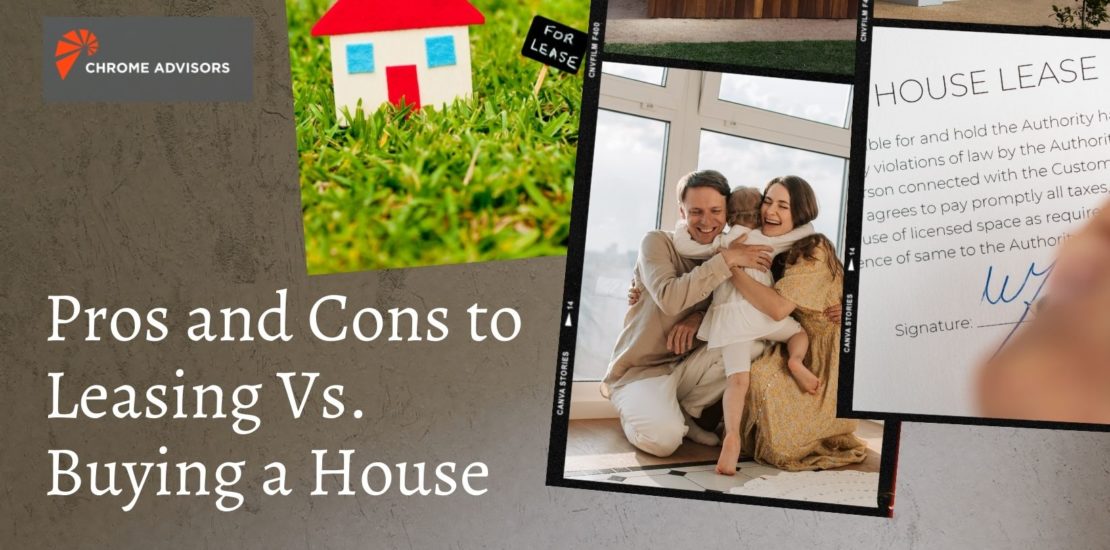- December 8, 2021
- Posted by: Virg Cristobal
- Category: Finance

At this stage of your life, you’re probably vacillating between leasing or renting a home versus owning one. Are there benefits to either? Disadvantages? Pros and cons or is there a third alternative? If you are tired of going from renting and paying someone else’s mortgage and you’re looking for something a little bit more permanent, you’re probably at this crossroads, however, is owning really the right decision? There are benefits to both but let’s really break it down to the pros and cons of leasing a house versus buying a home.
Renting and leasing a house – Advantages & Disadvantages
Renting can offer flexibility, predictable monthly expenses, and someone else to handle repairs or replacements. This can be a huge benefit, especially for professionals that may be travel a lot for work or simply don’t have the time to deal with homeownership responsibilities. Most of the time you can move without a penalty within certain lease parameters and you have the benefit of having someone else take care of those repairs and homeownership responsibilities.
However, this also means that if your landlord decides to sell the property (which really only happens with a condominium or a single-detached house) you may end up losing your property. The landlord can also increase the rent, which may or may not be in your better interest. If it’s an apartment complex, chances are it’s going to stay that way but there are also disadvantages to living in an apartment versus a single-detached house as well.
There is one big myth, however, that you’re throwing money away every month on someone else’s mortgage. But while that literally may be the case, it’s going to cost you something to live anywhere and even though you may not be building equity with monthly rental payments, you don’t have all the additional homeownership costs incurred each month with repair and upkeep.
When you choose to rent or lease a property, you know exactly how much to spend on housing each month. With a mortgage payment, it’s true that you’ll have the mortgage payment as well as property taxes, homeowners insurance, potentially HOA’s, interest, and principal, but you also have the unexpected expenses of utilities that can vary greatly from month to month and any repairs or unexpected replacements and updates.
Related: Learn more about wealth management goals for the tech employee
Owning a house – Advantages & Disadvantages
Now, owning a house can offer intangible benefits such as a sense of stability, ownership in a community, and the pride of homeownership. If you’re planning on staying in one location for at least 4 to 5 years, owning a property can definitely offer you a great rate of return. Regardless of the market, home values continue to rise over time and even if there is a dip from time to time, if you hang onto it long enough, it will eventually continue to increase.
However, you do have additional expenses as previously mentioned in the leasing and renting section. In addition to paying a mortgage payment which is principal and interest, you’ll also have property taxes, homeowners insurance, additional insurance such as earthquake or flood insurance if needed, maintenance insurance such as pool cleaning, pest control, utilities, and maybe even landscaping.
The mortgage and interest is going to be your biggest expense and that will make up nearly all of your monthly payment, however, you are also putting money away. So, if you’re paying $3000 a month in mortgage payments and you’re paying down anywhere from $1000-$2000 in principal, but your home is actually increasing that amount every single month, you could actually be gaining $3000-$5000 a month in equity depending on the price of your home, how much you owe, and all those extenuating circumstances. This is definitely something you’re not going to be earning with the lease or rental payment.
The Basics
Basic comes down to your particular situation which is why a financial advisor and wealth management consultant can really help lay out all of the costs, weigh the pros and cons for your specific finances and situation, and offer a variety of options to help you make an informed decision. Buying a home means your payments build equity, they will be tax-deductible, it’s a forced savings situation and its stability.
The pros of renting may include cheaper house payments, no taxes or maintenance, no down payment, and it’s easier to move if need be. These may appeal to different situations so it’s important to understand where you are, where you want to be in five years, and your overall trajectory for financial security.
Contact Chrome Advisors today for more information and a free consultation on how we can help manage your finances and wealth for a better future.
More Chrome Advisor Information:
4 Ways Young Rising Professionals Can Care for Aging Parents
Equity Compensation for Employees
10 Reasons Young Professionals Should Have a Last Will and Testament
Do We Need to Think About Estate Planning?
Should you buy or lease a new car?